#Shibley Telhami
Text
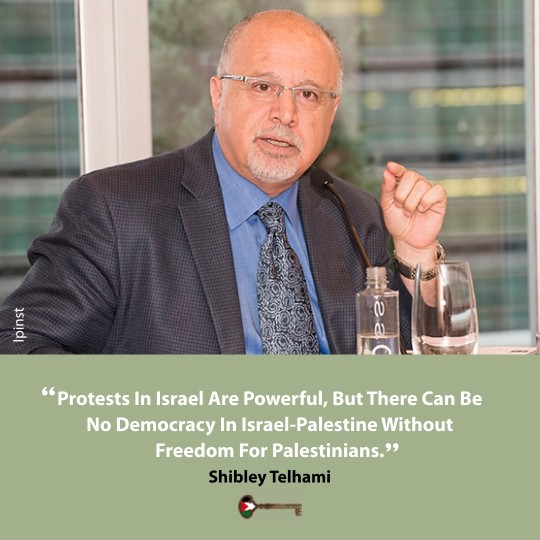
“Protests in israel are powerful, but there can be no democracy in Israel/Palestine without freedom for Palestinians.”
#shibley telhami#free palestine#palestine#politics#world news#israel#news#human rights#jerusalem#west bank#gaza
3 notes
·
View notes
Text
The one-state reality goes mainstream
Writing in the journal Foreign Affairs, four noted, quite mainstream scholars of U.S. policy in the Middle East–Michael Barnett, Nathan Brown, Marc Lynch, and Shibley Telhami–describe “The One-State Reality” that exists in Palestine and Israel today. The piece is meant to promote their book, The One-State Reality: What Is Israel-Palestine? I should note, the book features a collection of essays…

View On WordPress
#Antony Blinken#Israel Lobby#Israel Protests 2023#Joe Biden#Marc Lynch#Martin Indyk#Michael Barnett#Nathan Brown#One State reality#Progressive Except for Palestine#shared values#Shibley Telhami#Special Relationship#Two-state solution#United States
0 notes
Text
As the war in Gaza has unfolded, many Israelis have argued that there can be no return to the status quo, by which they mean no cease-fire without the total “destruction” of Hamas. But the alternatives to Hamas rule that Israeli leaders have proposed are very much a continuation of the existing situation. Israel is not suddenly conquering Gaza: it never ceased controlling it, a reality that is all too present for Gazans who have suffered for 17 years under the Israeli blockade. It is more accurate to say that Israel, which has been the sovereign occupying power in Gaza for 56 years under a variety of political configurations, is once again attempting to rewrite the rules of its domination. And as the Israeli government has made clear, it has no intention of pursuing a renewed quest for a Palestinian state.
Israelis had soured on a two-state solution long before October 7. Over the past decade, the Israeli peace camp, represented by the Meretz Party, had declined electorally to the point of near elimination; in 2022, it failed to cross the electoral threshold for Knesset representation. The current Israeli government had all but disavowed a two-state outcome and included right-wing members who openly aspired to full annexation of Gaza and the West Bank. October 7 accelerated the trend. The Israeli public has overwhelmingly lost what little faith remained in a two-state outcome, as a settler movement intent on dominating all the land between the Jordan River and the Mediterranean Sea has relentlessly risen to power.
Marc Lynch and Shibley Telhami, The Two-State Mirage
88 notes
·
View notes
Text
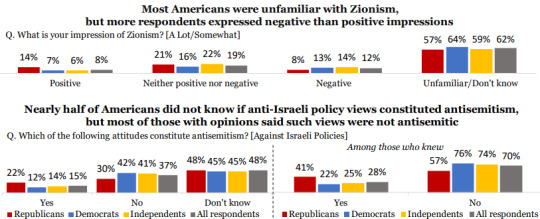
Note that this study was conducted in June of 2023
"62% of Americans have no idea what Zionism is. Zionism is, of course, a form of Jewish nationalism born in Central Europe in the late 19th century, which seeks to turn the Jewish religion into a platform for a state, and which excludes non-Jews from sovereignty over territory claimed by this Jewish state.
[...]
Saying that Israel must be democratic and Jewish is like saying the United States must be democratic and white or democratic and Christian. The second, ethnic supremacist, demand is profoundly undemocratic and so the second part of the phrase stealthily negates the first.
Joe Biden says he is a Zionist, and given his behavior during the past three months, I think we have to conclude that he is an extreme sort of Zionist. It is baffling that the overwhelming majority of Americans doesn’t even know what he means when he says this, or what the ideology is of the country that receives more US aid than any other in the world."
12 notes
·
View notes
Text
“In the West Bank, the Palestinian Authority is really no more than a service provider at a local level to the Palestinians, and something like a subcontractor for Israeli security. It certainly has no power in defending Palestinians against not only Israeli military incursions, but even against settler violence, which is expanding in the West Bank.”
5 notes
·
View notes
Text
What is needed to stop the fighting in Gaza
This was a fine event.
As Shibley Telhami underlines, the priority right now is to end the fighting in Gaza. But war is an enterprise with political objectives. So we need to consider what the parties involved want and what might bring the fighting to a negotiated end.
Hamas objectives
Hamas’s heinous mass murder and mayhem on October 7 likely had several objectives: to claim leadership of the…
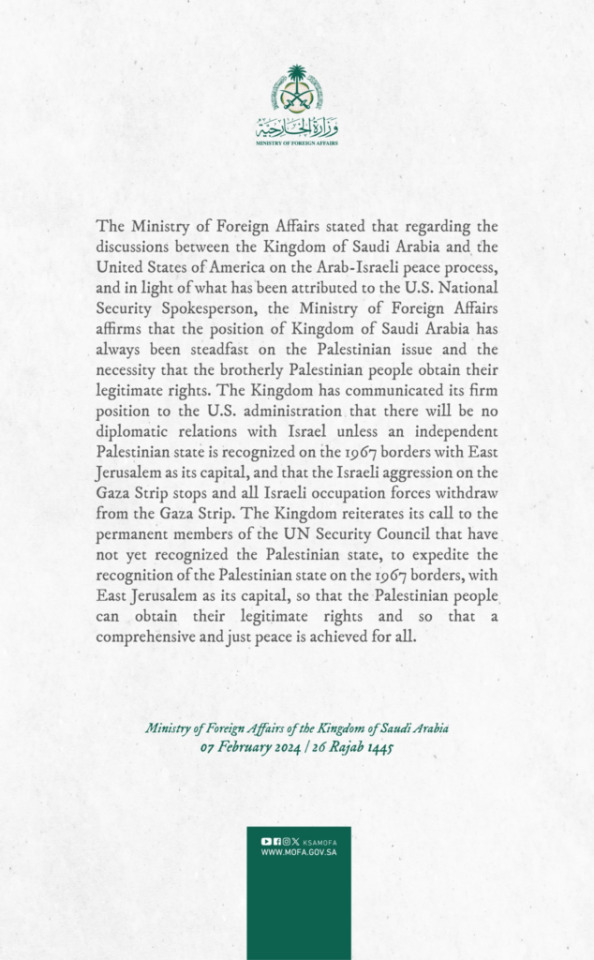
View On WordPress
0 notes
Text
1 note
·
View note
Text
0 notes
Text
Mindless terrorists? The truth about Isis is much worse.
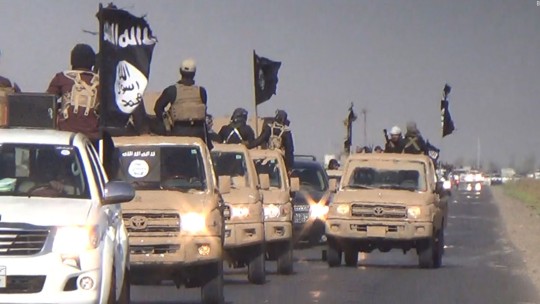
Because of what I've read, there are quotations or comments on ISIS, thus this post is based on people's opinions. In December, the Special Operations commander for American forces in the Middle East, Major General Michael K. Nagata, said in the New York Times that he had only recently started to comprehend the attraction of the Islamic State. We still haven't beaten the idea, he said. President Obama stated last year that "We don't even understand the concept," referring to the Islamic State as "not Islamic" and al-Qaeda's team in remarks that showed misunderstanding of the organization and may have led to serious tactical blunders.
While declaring in the spring that the United States will withdraw its forces from Afghanistan by the fall, President Biden stressed terrorist concerns but made no mention of Islamic State Khorasan, commonly known as ISIS-K, the Islamic State's affiliate in Afghanistan. Avril Haines, the director of national intelligence, hardly addressed ISIS-K in her risk assessments for Afghanistan as recently as April. Mr. Biden mentioned the group in a speech on the desperate attempt to save stranded Americans and helpless Afghans after the Taliban had taken control of Afghanistan on August 20.
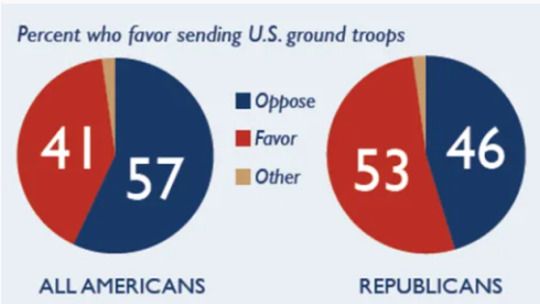
There is still debate about America's commitment to the goal of "degrading and ultimately destroying" this terrorist organization, as well as the effectiveness of the current military strategy in preventing ISIS from capturing territory and murdering civilians, despite the fact that the fight against the Islamic State, or ISIS, found widespread support in Congress and among a growing international coalition. In order to better understand how the American people feels about the formation of the Islamic State and the U.S. operation to combat it in Syria and Iraq, nonresident Senior Fellow Shibley Telhami conducted a survey. Below are some of the study's most important findings, along with a download link for the complete results.
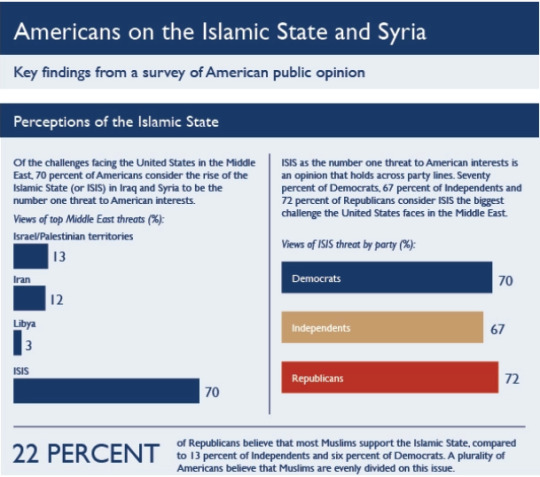
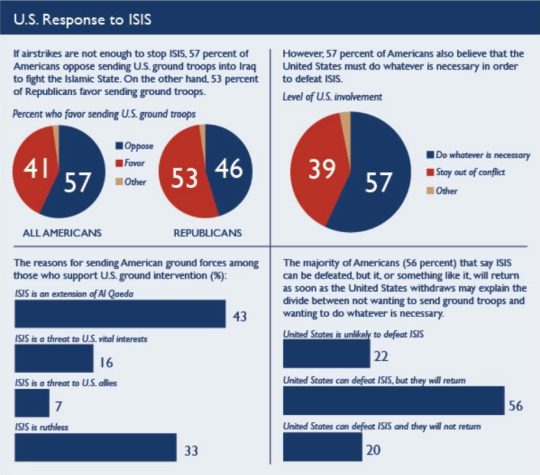
The group of participants was taken from the KnowledgePanel, a wider permanent panel run by the research firm GfK. Despite the fact that these polls are conducted online, this panel was not created through a "opt-in" process whereby any web user might volunteer to participate. Instead, panelists are chosen scientifically by two methods: a random selection of residential addresses utilizing the Delivery Sequence File of the United States Postal Service.
0 notes
Text
Trump's summit with Kim Jong Un may give him some political benefits for midterms
Trump’s summit with Kim Jong Un may give him some political benefits for midterms
Author: John Fritze / Source: USA TODAY
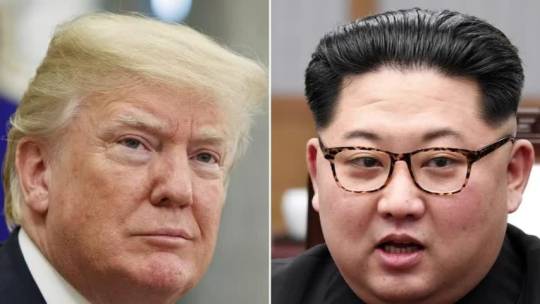
United States President Donald Trump said on Saturday that his upcoming summit with Kim Jong Un was a “one-time shot” for the North Korean leader. (June 9) AP

WASHINGTON — When it comes to international affairs, President Trump’s meeting with North Korean Leader Kim Jong Unis fraught with the potential for misunderstanding and renewed tension between two…
View On WordPress
0 notes
Link
wowwwwwwwwwww
As our University of Maryland Critical Issues Poll research has shown, evangelical attitudes toward Israel account for most of the Republican Party’s support for Israel; without evangelicals, Republican attitudes on Israel do not substantially deviate from the rest of America. ...
ut a new survey commissioned by University for North Carolina at Pembroke researchers, carried out by Barna Group, has exposed what we have been finding for some time: younger evangelicals are much less supportive of Israel than older evangelicals, by a widening margin. The poll found a dramatic shift in attitudes between 2018 and 2021: support for Israel among young evangelicals dropped from 75% to 34%. This raises questions about the sustainability of the strong evangelical support for Israel that the Israeli right has cultivated for years and that proved reliable during the Trump administration. ...
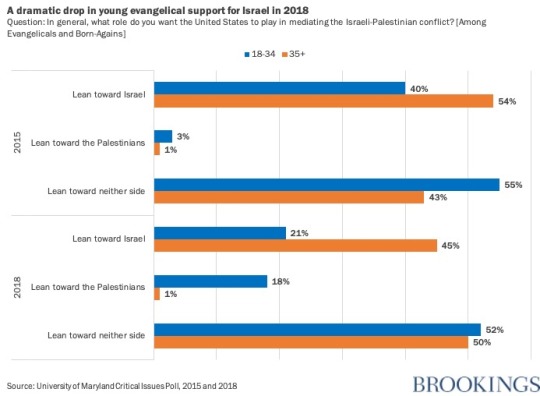
3 notes
·
View notes
Text
Thursday, May 20, 2021
For Migrant Children in Federal Care, a ‘Sense of Desperation’
(NYT) In a federal shelter in Dallas, migrant children sleep in a windowless convention center room under fluorescent lights that never go dark. At a military base in El Paso, teenagers pile onto bunk cots, and some say they have gone days without bathing. And in Erie, Pa., problems began emerging within days of the shelter’s creation: “Fire safety system is a big concern,” an internal report noted. Some of the hot water heaters were not working, and lice was “a big issue and seems to be increasing.” Early this year, children crossing the southwestern border in record numbers were crammed into Customs and Border Protection’s cold-floored, jail-like detention facilities. They slept side by side on mats with foil blankets, almost always far longer than the legal limit of 72 hours. Republicans declared it a crisis. Democrats and immigration groups denounced the conditions, which erupted into an international embarrassment for President Biden, who had campaigned on a return to compassion in the immigration system. The administration responded by rapidly setting up temporary, emergency shelters, including some that could house thousands of children. But the next potential crisis is coming into view. “I know the administration wants to take a victory lap for moving children out of Border Patrol stations—and they deserve credit for doing that,” said Leecia Welch, a lawyer and the senior director of the legal advocacy and child welfare practice at the National Center for Youth Law, a nonprofit law firm focused on low-income children. “But the truth is, thousands of traumatized children are still lingering in massive detention sites on military bases or convention centers, and many have been relegated to unsafe and unsanitary conditions.”
Ceasefire calls and U.S. credibility
(Foreign Policy) As the bombings [in Gaza] continue, the human toll is becoming clearer. More than 52,000 people in Gaza have been displaced by Israel’s aerial assault, the United Nations Office for the Coordination of Humanitarian Affairs (OCHA) said on Tuesday, with most seeking refuge in U.N.-run schools. The Norwegian Refugee Council (NRC) confirmed that 11 of the more than 60 children killed so far by Israeli airstrikes were participants in an NRC program helping children deal with trauma. Even if hostilities soon end, the Biden administration’s resistance to a U.N. Security Council resolution calling for a cease-fire has tested U.S. credibility. “They pledged to come back and support the U.N. system and multilateralism,” one council diplomat said in a report by Foreign Policy’s Colum Lynch and Robbie Gramer. “We don’t see that happening now in the Security Council.” The episode also encouraged China to carve out a leadership role at the Security Council on Middle East issues, a topic where it usually takes a back seat, while at the same time allowing it to dodge questions on its actions in Xinjiang. Multiple reports appeared on Tuesday, attempting to shine light on Biden’s approach not to call publicly for a cease-fire. They depict an administration wary of getting on the bad side of Israeli Prime Minister Benjamin Netanyahu. The tactic has been criticized as a misreading of U.S. leverage over an ally to which it provides significant military aid and political support. Shibley Telhami, writing in the Boston Globe, voiced some of that criticism on Tuesday. “If an American president cannot leverage this extraordinary and unprecedented support to advance core American values,” Telhami writes, “what hope is there for succeeding anywhere else?”
Spain Sends Troops to African Enclave After Migrant Crossings Jump
(NYT) Spain deployed troops, military trucks and helicopters in its North African enclave of Ceuta on Tuesday after thousands of people crossed over from Morocco, one of the largest movements of migrants reported in the area in recent years. More than 8,000 migrants, including nearly 2,000 minors, arrived on the beaches of Ceuta on Monday and Tuesday, mostly swimming or aboard inflatable boats, according to the Spanish authorities, who said that Spain had already sent back 4,000 people. The sudden arrival of thousands of people in Ceuta—more than had attempted the crossing in all the rest of the year so far—comes amid a deepening diplomatic spat between Spain and Morocco over the hospitalization in Spain of the leader of a rebel group that has fought for the independence of Western Sahara from Morocco. Videos broadcast on Spanish television on Tuesday appeared to show Moroccan border guards opening fences to the Spanish enclave. While Morocco has warned of “consequences” for harboring the rebel leader, it was not immediately clear if the spike in migration was linked to the diplomatic dispute.
Grand day for the French: Cafe and bistro terraces reopen
(AP) It’s a grand day for the French. Cafe and restaurant terraces reopened Wednesday after a six-month coronavirus shutdown deprived residents of the essence of French “joie de vivre”—sipping coffee and red wine with friends. The French government is lifting restrictions incrementally to stave off a resurgence of COVID-19 and to give citizens back some of their world famous lifestyle. As part of the plan’s first stage, France’s 7 p.m. nightly curfew was pushed back to 9 p.m. and museums, theaters and cinemas reopened along with outdoor cafe terraces. France is not the first European country to start getting back a semblance of social and cultural life. Italy, Belgium, Hungary and other nations already allow outdoor dining while drinking and eating indoors began Monday in Britain.
Indian navy searches for 78 missing from barge sunk by storm
(AP) Indian navy ships and helicopters searched in rough weather and seas Wednesday for 78 people still missing from a barge that sank off Mumbai as a deadly cyclone blew ashore this week. Navy Cdr. Alok Anand said 183 people were rescued within 24 hours by three ships and helicopters engaged in the operation. Cyclone Tauktae, the most powerful storm to hit the region in more than two decades, packed sustained winds of up to 210 kilometers (130 miles) per hour when it came ashore in Gujarat state late Monday. The storm left at least 25 dead in Gujarat and Maharashtra states. The Hindu newspaper Wednesday tallied more than 16,000 houses damaged in Gujarat state and trees and power poles uprooted.
How Myanmar's military moved in on the telecoms sector to spy on citizens
(Reuters) In the months before the Myanmar military's Feb. 1 coup, the country's telecom and internet service providers were ordered to install intercept spyware that would allow the army to eavesdrop on the communications of citizens, sources with direct knowledge of the plan told Reuters. The technology gives the military the power to listen in on calls, view text messages and web traffic including emails, and track the locations of users without the assistance of the telecom and internet firms, the sources said. The directives are part of a sweeping effort by the army to deploy electronic surveillance systems and exert control over the internet with the aim of keeping tabs on political opponents, squashing protests and cutting off channels for any future dissent, they added.
Restrictions reimposed as virus resurges in much of Asia
(AP) Taxi drivers are starved for customers, weddings are suddenly canceled, schools are closed, and restaurant service is restricted across much of Asia as the coronavirus makes a resurgence in countries where it had seemed to be well under control. Sparsely populated Mongolia has seen its death toll soar from 15 to 233, while Taiwan, considered a major success in battling the virus, has recorded more than 1,000 cases since last week and placed over 600,000 people in two-week medical isolation. Hong Kong and Singapore have postponed a quarantine-free travel bubble for a second time after an outbreak in Singapore of uncertain origin. China, which has all but stamped out local infections, has seen new cases apparently linked to contact with people arriving from abroad. The resurgence hasn’t come close to the carnage wrought in India and parts of Europe, but it is a keen reminder that the virus remains resilient.
Immigration In Japan Under Pressure
(NYT) For months Japanese jailers said they ‘thought’ the young migrant from Sri Lanka was faking her illness, even as she wasted away before their eyes before dying alone in her cell. Wishma Rathayake had a lifelong fascination with Japan. She entered the country in the summer of 2017 to study Japanese at a school in the Tokyo suburbs, hoping eventually to teach English. She met another Sri Lankan student in Japan who became her boyfriend. Sadly, after a series of unwise decisions, unfortunate events, and a now-expired residence permit, she found herself in a detention center a few hours south of Tokyo, awaiting deportation. It was August 2020. While in detention she was threatened by her ex-boyfriend, now back in Sri Lanka. She thought she’d be safer in Japan, and with the encouragement of advisers at START, a local nonprofit, she decided to try to stay. That move irritated officials at the detention center, who demanded she change her mind. In late December Wishma fell ill with a fever. Within weeks she was having trouble eating, standing, and speaking. In late January 2021 a doctor prescribed her vitamins and painkillers, but they made her even sicker, so she filed for a provisional release. Detention centers had already released hundreds of healthy detainees due to coronavirus concerns, but in mid-February Wishma’s request was denied without explanation. She submitted a second request on medical grounds; by this time she was so weak she could barely sign the form. Despite the severity of her symptoms, officials waited until March 4 to take her to a hospital. Two days later the 33-year-old was dead.
Japan has a long history of hostility toward immigration. Despite being the world’s third-largest economy, it settles less than 1% of asylum applicants—just 47 in 2020. Critics of the country’s immigration system say most decisions are made in secret; detainees who have overstayed their visas can be held indefinitely, with little access to courts. Detainees who apply for asylum, as Wishma did, are particularly unwelcome. Critics say Wishma was the victim of an opaque and capricious bureaucracy that has nearly unchecked power over foreigners who run afoul of it. And while there have been other instances of inhumane treatment of foreigners that ended in death, especially for people of color, the particularly egregious circumstances of Wishma’s death have driven national outrage to a whole new level. Protesters have gathered almost daily in front of Parliament, and objections by opposition lawmakers have been unusually fierce.
Experts warn shuttered Australia is becoming a ‘hermit nation’
(AFP) Prime Minister Scott Morrison defended his “Fortress Australia” Covid-19 restrictions Tuesday, as experts warned that plans to keep the borders closed for another year will create a “hermit nation”. Last March, Australia took the unprecedented step of closing its borders to foreign visitors and banning its globetrotting citizens from leaving. That prompted the first population decline since World War I, stranded tens of thousands of Australian citizens overseas and separated hundreds of thousands of residents from family members. But the country now has almost no community transmission and life for most is relatively normal. And the government’s recent suggestion that borders could remain closed for another year has sparked fierce debate. Australian Medical Association president Omar Khorshid on Tuesday warned: “Australia cannot keep its international borders closed indefinitely.” A University of Sydney task force examining how Australia can safely reopen this week went further, warning the country “cannot continue to lock itself off from the world as a hermit nation indefinitely”.
Powerless
(NYT) Abeer Ghanem, like many Gazans, long struggled to work around the long blackouts that blighted the besieged Palestinian enclave along the Mediterranean Sea. But with the outbreak of hostilities a week ago between Israel and the Hamas militant group that governs the Gaza Strip, she said, she now gets at best four hours of electricity a day, intermittently. When it comes on, her family scrambles to charge their lights and batteries for the long, sleepless nights punctuated by outgoing Hamas rockets and the thunder of Israeli airstrikes. A combination of fuel shortages, damage to the electricity supply lines running from Israel and an aerial bombardment that has torn apart local power lines means that many families are receiving at most three to four hours of electricity a day, according to Gaza’s power company. “What we have now for fuel will last for two or three days,” said Mohammed Thabet, a spokesman for the Electricity Distribution Co. of Gaza. The power shortages are compounding the daily misery for Gazans and are also taking a toll on the provision of water, sewage treatment and the ability of hospitals, swamped with casualties, to function. Even if supplies resume, the crisis has caused millions of dollars in infrastructure damage.
Palestinians go on strike as Israel-Hamas fighting rages
(AP) Palestinians across Israel and the occupied territories went on strike in a rare collective protest Tuesday as Israeli missiles toppled a building in Gaza and militants in the Hamas-ruled territory fired dozens of rockets that killed two people. The general strike was a sign that the war could widen again after a spasm of communal violence in Israel and protests across the occupied West Bank last week. Although the strike was peaceful in many places, with shops in Jerusalem’s usually bustling Old City markets shuttered, violence erupted in cities in the West Bank. Hundreds of Palestinians burned tires in Ramallah and hurled stones at an Israeli military checkpoint. Troops fired tear gas, and protesters picked up some of the canisters and threw them back. Three protesters were killed and more than 140 wounded in clashes with Israeli troops in Ramallah, Bethlehem, Hebron and other cities, according to the Palestinian Health Ministry. The Israeli army said two soldiers were wounded by gunshots to the leg. The general strike was an uncommon show of unity by Palestinian citizens of Israel, who make up 20% of its population.
1 note
·
View note
Video
youtube
What Shrugging Off a Two-state Solution Could Mean for Peace Prospects With Prime Minister Benjamin Netanyahu at his side, President Trump served notice that he's not wedded to long-standing U.S.
#Anwar Sadat#Anwar Sadat Professor for Peace and Development#Benjamin Netanyahu#Brookings Institute#President Trump#Shibley Telhami#Tamara Wittes#University of Maryland
0 notes
Text
Xung đột Israel - Palestine leo thang và thế khó của Mỹ
New Post has been published on https://finnews24.com/xung-dot-israel-palestine-leo-thang-va-the-kho-cua-my/
Xung đột Israel - Palestine leo thang và thế khó của Mỹ
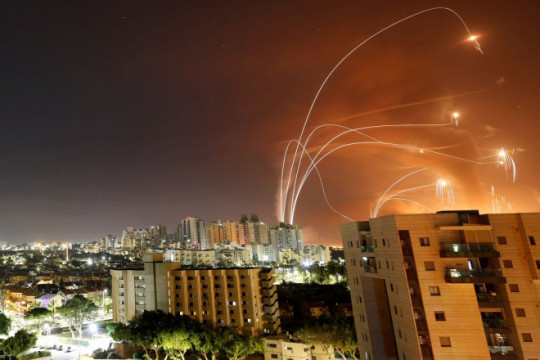
Tin tức thế giới: Xung đột Israel – Palestine leo thang
Bạo lực gia tăng giữa Israel và Palestine tiếp tục tiến hành lập lại hòa bình trên dải Gaza. Trong khi đó, chính quyền của ông Biden gặp khó khăn trong việc ủng hộ đồng minh Israel.
Ngày 12-5 (giờ địa phương), hãng tin Reuters dẫn tuyên bố của quân đội Israel cho biết từ hôm 10-5, ít nhất 1.000 quả rocket được phong trào Hồi giáo Hamas của người Palestine phóng đi liên tục từ dải Gaza nhằm vào lãnh thổ Israel, tập trung chủ yếu vào TP Tel Aviv. Hệ thống phòng thủ Vòm Sắt của Israel được cho là đã đánh chặn thành công khoảng 850 quả. Hiện chưa có thông tin về thương vong trong đợt tấn công nhưng một số tòa nhà trong khu vực bị đánh trúng có dấu hiệu bị hư hại.
Đi tìm nguyên nhân xung đột Israel – PalestineĐáp trả, Israel cùng ngày lập tức điều máy bay không kích nhiều trụ sở của phong trào Hamas và khẳng định đã tiêu diệt 16 thành viên của lực lượng này, trong đó có một chỉ huy cấp cao là Bassim Issa cùng một số chuyên gia phát triển vũ khí khác. Hơn 35 dân thường cũng thiệt mạng trong đợt không kích đáp trả của Israel.
Các cuộc đụng độ nói trên là diễn biến mới nhất trong chuỗi căng thẳng nổ ra gần đây giữa người dân Israel và Palestine. Theo tạp chí Vox, bạo lực bùng phát hồi cuối tháng 4 khi người Palestine biểu tình phản đối cảnh sát Israel vì không cho họ vào TP Jerusalem, nơi có nhà thờ Hồi giáo Al-Aqsa trong tháng diễn ra lễ Ramadan truyền thống của tôn giáo này. Người Palestine coi đây là hành vi hạn chế quyền tự do tụ họp và tự do tôn giáo, trong khi phía cảnh sát Israel khẳng định đây chỉ là biện pháp duy trì trật tự.
Ngoài ra, họ cũng bất bình vì chính quyền Israel gần đây đẩy mạnh trục xuất một số người Palestine ra khỏi nhà để nhường chỗ cho người định cư Israel. Trên thực tế, đây là nguyên nhân chính dẫn đến nhiều vụ đụng độ kể từ đầu năm nay khi Tòa án vùng Jerusalem ra phán quyết ủng hộ người định cư Do Thái muốn chuyển tới sống ở khu đất đang có nhà của nhiều gia đình Palestine.
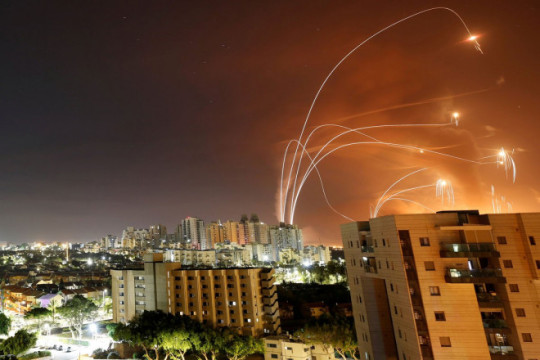
Hệ thống phòng thủ Vòm Sắt của Israel đánh chặn các rocket của Hamas ngày 12-5. Ảnh: REUTERS
Nhìn lại lịch sử, trong cuộc chiến sáu ngày giữa Israel, Jordan, Syria và Ai Cập hồi năm 1967, Israel đã chiếm và kiểm soát toàn bộ TP Jerusalem cho đến nay. Israel cũng chiếm Bờ Tây, cao nguyên Golan và bán đảo Sinai. Sau này, bán đảo Sinai được trả lại cho Ai Cập theo thỏa thuận hòa bình năm 1979 nhưng Jerusalem và cao nguyên Golan vẫn nằm trong sự kiểm soát hoàn toàn của Israel. Người Palestine được hưởng quyền tự trị hạn chế ở khu vực phía đông Jerusalem và một số vùng đất ở Bờ Tây nhưng Israel vẫn kiểm soát toàn bộ vấn đề biên giới và an ninh.
Tình trạng này khiến đụng độ qua lại và gây thương vong cho cả hai phía. Ngày 8-5, cảnh sát chống bạo động của Israel đã trấn áp mạnh tay đối với hàng trăm người Palestine biểu tình tại đền thờ Al-Aqsa ở Jerusalem, khiến khoảng 170 người bị thương. Người Palestine lúc đó quá khích ném đá, chai lọ và pháo hoa về phía cảnh sát Israel, khiến lực lượng này đáp trả bằng đạn cao su và lựu đạn. Tổ chức Trăng lưỡi liềm đỏ (IFRC) chi nhánh Palestine đã phải dựng bệnh viện dã chiến gần khu vực xảy ra xung đột.
Mỹ bị đặt vào thế khó xử
Israel hiện là một trong những đồng minh thân cận nhất với Mỹ và gần như là đồng minh duy nhất mà Washington có thể tin cậy được ở Trung Đông. Bên cạnh đó, Mỹ cũng cần sự ủng hộ của Israel trong vấn đề đàm phán tái gia nhập thỏa thuận hạt nhân 2015 với Iran. Do vậy, tình hình căng thẳng hiện tại giữa Israel và Palestine chắc chắn sẽ là mối quan tâm lớn đối với chính quyền Tổng thống Joe Biden vì khi mới nhậm chức, ông Biden đã hy vọng có thể chuyển trọng tâm đối ngoại từ Trung Đông sang các khu vực khác trọng yếu hơn như Trung Quốc hay Nga.
Phát biểu trong cuộc họp báo ngày 12-5, Ngoại trưởng Mỹ Antony Blinken cho biết Washington đang rất quan ngại các diễn biến ở dải Gaza thời gian qua và khẳng định Mỹ sẽ tiếp tục giữ vững cam kết ủng hộ giải pháp hai nhà nước trong cuộc xung đột kéo dài giữa Israel – Palestine. Dù vậy, ông Blinken cũng nhấn mạnh là Washington ủng hộ quyền tự vệ chính đáng của Israel và mọi hành động bạo lực lúc này sẽ càng khiến nỗ lực hòa giải trở nên khó khăn hơn.
Theo đài CNN, phát ngôn của ông Bliken cho thấy Mỹ dù vẫn tỏ ra ủng hộ nhưng không thể đứng về phía Israel hoàn toàn sau các thiệt hại về người và của mà các đợt không kích của nước này gây ra. Hồi tháng 2, Ngoại trưởng Blinken từng tuyên bố chính quyền của ông Biden sẽ đẩy vấn đề quyền con người trở thành trọng tâm của chính sách đối ngoại Mỹ thời kỳ mới. “Mỹ cam kết hướng tới thế giới nơi quyền con người được bảo vệ, người bảo vệ quyền con người được coi trọng, còn người vi phạm phải chịu trách nhiệm” – ông Bliken cho hay.
Trả lời phỏng vấn của Vox, GS Shibley Telhami thuộc ĐH Florida (Mỹ) nhận định giờ là lúc Mỹ chịu áp lực phải thể hiện rõ nguyên tắc tôn trọng quyền con người này vì cả thế giới đang dõi theo diễn biến ở dải Gaza. Nếu chỉ vì muốn giữ lấy quan hệ đồng minh Israel thì chính quyền ông Biden sẽ có nguy cơ đánh mất uy tín trong mắt cộng đồng quốc tế.
Trên thực tế, nội bộ Mỹ cũng đã bắt đầu có nhiều tiếng nói yêu cầu Washington công khai lên án Israel. J Street – một tổ chức phi lợi nhuận ở Mỹ đấu tranh cho hòa bình giữa Palestine và Israel cuối tuần trước đã ra tuyên bố kêu gọi ông Biden đưa ra thông điệp rõ ràng rằng việc Israel trục xuất các gia đình Palestine khỏi phần phía đông Jerusalem là hoàn toàn không thể chấp nhận được.
Một số nghị sĩ đảng Dân chủ cũng gây áp lực với ông Biden. Nghị sĩ Chris Van Hollen, thành viên Ủy ban Quan hệ đối ngoại của Thượng viện Mỹ, mới đây cũng đăng trên trang Twitter chính thức dòng trạng thái nhắc nhở ông Biden đừng quên cam kết về ủng hộ quyền con người khi toàn thế giới đang rất bất bình trước cách hành xử của Israel với người Palestine.
Có thể thấy những biểu hiện và động thái của chính quyền mới ở Mỹ về vụ việc hiện tại ở Trung Đông phản ánh tình trạng lúng túng và bối rối của nước này – vốn đang trong quá trình tái hoạch định chiến lược ở Trung Đông nói chung và Israel nói riêng. Liệu các nguyên tắc mà chính quyền ông Biden đã đặt ra sẽ thắng thế hay ông sẽ lại tiếp tục coi trọng và thiên vị mối quan hệ với đồng minh Israel còn tùy thuộc khả năng Washington cân bằng thế nào giữa lợi ích quốc gia và các giá trị mà họ đang theo đuổi.
0 notes
Link
POLS477 In the News Post, 2/24/2021
Shibley Telhami and Marc Lynch of the Brookings Institute released the results of their joint study last week which surveyed around 1,300 scholars of the Middle East. The results were somewhat shocking, with 59% of respondents describing the current situation in Israel as “a one-state reality akin to apartheid.” When asked about the likelihood of a two-state “outcome” in the region, 52% of respondents answered “it’s no longer possible,” 42% of respondents thought “it’s possible, but improbable within the next ten years,” and only 6% answered “it’s possible and probable within the next ten years.” These survey findings support Al-Haq’s (an independent NGO for human rights in Palestine) claim that the international community is “mounting recognition” of Israel’s apartheid practices. Telhami and Lynch noted, “while the Biden administration will probably seek to kick-start diplomacy, the experts offer little hope for achieving a two-state solution.”
Interestingly, the results of this survey have been largely ignored by mass media (other than the Washington Post, who failed to include the findings in their headline, and Newsweek). Such findings beg the question: if a one-state solution is recognized as apartheid but a two-state solution is regarded as improbable or even impossible, what does the future of Israel-Palestine look like? When respondents were asked, “if there’s no two-state solution in ten years, which is most likely to describe the reality in Israel, the West Bank, and Gaza?”, 77% answered “a one-state reality akin to apartheid,” 17% predicted “a one-state reality with increasing inequality, but not akin to apartheid,” 3% thought “a confederation,” and only 1% answered “a single state with equality between Israelis and Palestinians.” 2% of respondents refused to answer the question.
***Mondoweiss is an American foreign policy blog (connected to the Center for Economic Research and Social Change), established in 2006 and co-edited by journalists Philip Weiss and Adam Horowitz.***
0 notes
Text
Why the discourse about Palestinian payments to prisoners’ families is distorted and misleading
New Post has been published on http://khalilhumam.com/why-the-discourse-about-palestinian-payments-to-prisoners-families-is-distorted-and-misleading/
Why the discourse about Palestinian payments to prisoners’ families is distorted and misleading

By Shibley Telhami The war of narratives on the Israeli-Palestinian conflict has intensified as the Trump administration is poised to leave the scene. As the New York Times recently reported, the Palestinian Authority (PA), whose relations with President Donald Trump were poisoned by his one-sided Middle East plan, is eager to build a new relationship with the incoming Joe Biden administration. Supporters of Israeli plans to annex parts of the West Bank would prefer to prevent this from happening. One of the issues standing in the way of U.S.-PA rapprochement is a PA system of monthly payments to families of prisoners held in Israel for political crimes, and to families of those killed in conflict, including those charged and convicted by Israel of terrorism. In 2017, Congress adopted legislation — the Taylor Force Act — which restricts assistance to the PA until it stops such payments. PA critics have labeled the system “pay to slay” — a clever and memorable name tag, but one that’s bigoted and distorted. It also distracts from the central culprit: 53 years of an Israeli occupation that has stunted and broken hundreds of thousands of lives. “Pay to slay” suggests that the PA pays Palestinians in order to kill Israelis and, worse, that those who commit violence against Israel are motivated to do so principally by monetary compensation for their families. Neither stands scrutiny, and making such insinuations is wrong and incendiary. Let’s start with the facts. Whatever one says about the PA and its president, Mahmoud Abbas — including its governance shortcomings, divisions, and political paralysis — Palestinian policing and security coordination with Israel have been an essential and highly successful element of Israeli security for years. This is to the chagrin of many Palestinians who are frustrated that PA security forces cannot, in parallel, protect them from the reach of Israeli forces or settlers. As one analyst put it, such coordination is “the one thing that has managed to keep the West Bank under control, and prevent events … from setting off a chain reaction that could end in a third intifada.” Abbas himself has consistently opposed violent resistance, including opposing the Palestinian embrace of the second intifada, the uprising that followed the collapse of the Israeli-Palestinian negotiations in 2000. The idea that payments to families are key drivers of violence doesn’t add up. Israeli collective punishment against the families of those accused of terrorism can be swift and severe. It can involve the demolition of the family home, sometimes rendering elderly parents, siblings, spouses, and children homeless — a practice that violates the Geneva Convention and has been condemned by international organizations and human rights groups. Any would-be attacker that might theoretically be motivated by family support payments in his or her absence would have to take these devastating factors into account. Punishment aside, one would have to assume that Palestinians are unlike other people in being able to ignore not only the personal risk of being killed or jailed, but also the emotional devastation and disruption that this would cause to the lives of their loved ones, simply for the promise of monetary stipends for the family. This isn’t to say that payments to prisoners’ families by the Palestinians, and the demolition of family homes by Israel, are non-factors in any calculation of a would-be perpetrator. The point is that the principal motives under occupation are usually political. Those living under occupation are often prepared to act and to pay a price, with or without either of the above practices in play. Also consider the significant variations in the frequency of violence over time, even as these practices have been in place.
Understanding the context
The context for the broad support among Palestinians for those imprisoned by Israel is that they see most of those jailed as victims and resisters of an illegal occupation. By 2009, it was already estimated that 700,000 Palestinians, including thousands of minors, had been detained since the Israeli occupation began; between 2017 and 2019 alone, 5,000 Palestinian minors between the ages of 12 and 18 were arrested. Few families have been untouched among the five million Palestinians living in the West Bank and Gaza. As an occupying power, Israel readily labels Palestinians as “terrorists,” including those who may not have been charged or convicted of a crime. Some are considered “terrorists” by common international definitions of terrorism adopted by independent human rights organizations, such as in cases of attacks on civilians; others are not. Prisoners include hundreds held for long periods in administrative detention without charge or trial. Unlike their settler neighbors who are tried for crimes under Israeli civil laws, Palestinians are tried in military courts — including those charged with nonviolent speech or protest activity — which have a near-100% conviction rate. Thus, Palestinian attitudes toward the prisoner family payment system have to be understood through the lens of their lived experiences. Under occupation, Palestinians have few protections from violence carried out by Israeli settlers or soldiers. According to the Israeli group Yesh Din, between 2005 and 2019 over 90% of cases of crimes against Palestinians were closed without any indictments. It is also all too common for Israeli soldiers to receive only minor punishments after being found guilty of taking a Palestinian life without cause, such as in the recent case of Eyad al-Hallaq, a young autistic man chased down and killed by a border policeman while walking with a surgical face mask and rubber gloves in hand. Families of Israelis who commit crimes against Palestinians certainly don’t suffer house demolitions, and in fact can find support: For example, the Israeli NGO Honenu (which receives tax-exempt contributions in the U.S. and Israel) has provided family support aid to Israelis in the wake of crimes against Palestinians (and even to the assassin of former Israeli Prime Minister Yitzhak Rabin, Yigal Amir, and his wife). In this context — with universal mistrust of the Israeli occupation system — there is strong public support among Palestinians for prisoners and their families. The PA has also argued that if innocent families of those imprisoned or killed are left without support, more would be radicalized, increasing rather than decreasing the likelihood of violence.
A Symptom, not a root cause
Both sides have suffered greatly from this conflict. Israelis have suffered hundreds of civilian casualties, particularly during the violent second intifada. Still, throughout the Israeli occupation, the overwhelming majority of those killed in conflict have been Palestinians; from 2000 to 2014, for example, the Israeli human rights group B’Tselem recorded 8,166 conflict-related deaths. Of those, 7,065 (87%) were Palestinian and 1,101 (13%) were Israeli. Over 100,000 Palestinians have been wounded since 2008, and over 90% of the Palestinians in the West Bank and Gaza have known nothing but life under occupation. There is no end in sight to land expropriation, lack of basic freedoms, and lack of access to impartial justice. Eager to turn the page on the Trump administration and reach out to the new administration, the PA has now signaled its openness to address the current structure of its prisoner payments policy, though it remains unclear how, especially given how the Palestinian public feels about this issue. But the worst thing for our public discourse would be to pretend that this practice — not the unending occupation — is a root cause, rather than a symptom, of the ongoing conflict and the central problem that needs urgent tackling. That would not serve the goal of a just peace that’s sorely needed.








0 notes